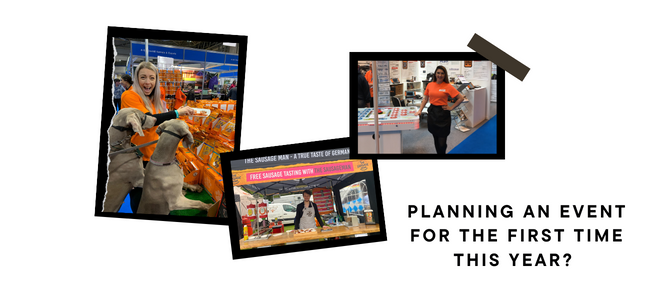Post-Exhibition Follow-Up: Keeping the Momentum Going Exhibitions, conferences, and business events create valuable opportunities to…

Planning an event for the first time this year?
Planning an event for the first time this year?
Take a look at our ten steps to making your event a success.
AIM
The first thing to do is to identify exactly why you want to hold this event. What is the target market, and how can you achieve your aims?
CREATE A TEAM
You cannot do everything yourself. Running an event is hard work. Organise a team to help you. This allows you to delegate specific parts of the event such as venue, publicity, staffing, transport, speakers. All you have to do is supervise and ensure that those functions are completed to schedule.
You can also hire external staff such at exhibition staff, help to set up and pack down, presenters, sales people and so on.
Arrange regular team meetings so that everyone is aware of what is happening in the various activities and you can quickly react if any problems are beginning to emerge.
SET A DATE
Decide exactly when you are planning to hold the event. Make sure it is timely, and matches your company requirements.
Make sure you have enough time to organise it – you will need to allow planning time of at least four to six months.
Ensure your chosen venue is booked for that date and that all key participants such as speakers are available.
CHOOSE AN EVENT THEME
Theming your event can make it much more identifiable, and enables it to stand out. Choose a theme that matches your aims, and create a name and tagline that sums it up.
ORGANISE A SCHEDULE
Creating a clear schedule ensures that you keep on top of all activities and never miss a deadline. This can be crucial when booking venues, speakers and catering facilities because these can get booked up very quickly.
Other elements that should be included on that schedule are:
• Entertainment
• Publicity
• Additional staffing
• Car parking
• Insurance, contracts and any permits
Check that timings on the schedule are being met at every team meeting. It will help you keep track of the event planning process.
SPONSORSHIP
Are you planning to have any part of the event sponsored? If so, you will need to identify potential sponsors and talk to them well in advance of the event.
PUBLICITY
You need lots of publicity to get people to actually come to the event. It starts with initial announcements and you can then build up publicity throughout the planning process. Think about social media, eye catching promotional activities, media involvement and any outreach activities.
BUDGET
Identify your budget early in the planning process. Check continually to make sure that you are staying within that budget. Know exactly how much you can pay for facilities like catering, extra staff, promotion and publicity. Allow for extras – they will occur!
ON THE DAY
Be at the event well ahead of time. This will allow you to deal with any unexpected hitches that occur.
POST EVENT EVALUATION
Seek feedback from your team, venue, sponsors, caterers and all participants to identify how it could have been improved. This will provide valuable assistance when it comes to organising future events.
[su_box title=”GET IN TOUCH” box_color=”#0671A9″ title_color=”#000000″]

